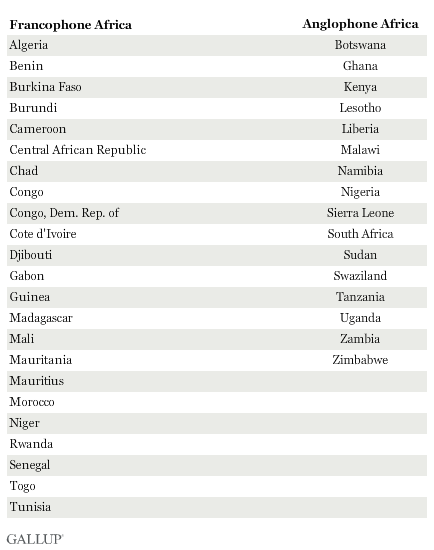This article is the first in a series that highlights key issues in Africa in relation to the first-ever U.S.-Africa Leaders Summit taking place in Washington, D.C., on Aug. 4-6.
WASHINGTON, D.C. — Africans are among the most likely in the world to believe people in their countries can get ahead by working hard. The 85% of Africans who said they believed this in 2013 rivals results found in more developed nations, and is on par with the 84% who believe this in Northern America. This faith in work ethic could be a major asset to plans that may emerge next week at the U.S.-Africa Leaders Summit, where African and U.S. leaders will focus on ways to stimulate growth and opportunities for the next generation.
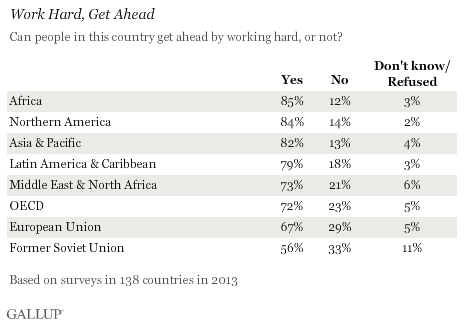
For many Africans, working hard is not an option; it’s often required to meet even their most basic needs. This mindset may help explain why such sizable majorities in all 32 African countries surveyed in 2013 believe people can get ahead through hard work, ranging from nearly universal acceptance in places such as Malawi (98%) and Ghana (97%) to less than two-thirds sharing this view in Angola (63%).
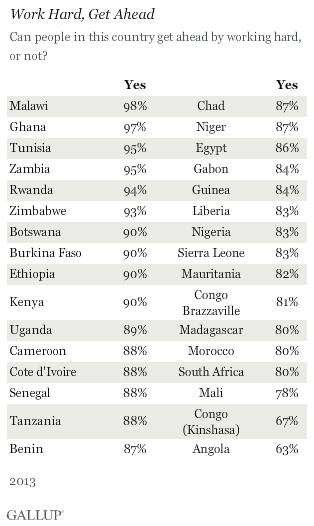
Although large percentages of Africans living in Francophone — or French-speaking — countries and Anglophone — or English-speaking — countries believe it’s possible to get ahead through hard work, residents in Francophone countries have lagged behind Anglophone countries for the past several years. The gap has been narrowing, but the persistent differences illustrate the different political and economic realities in these countries.
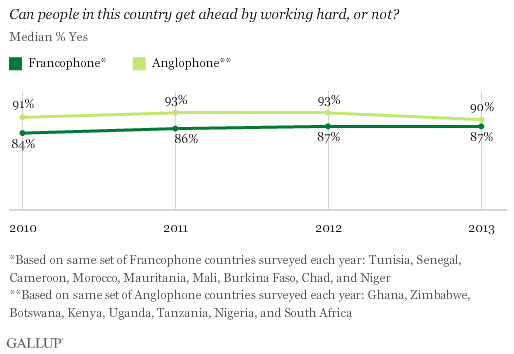
These relatively small differences are magnified in what residents in Francophone and Anglophone countries view as most valuable to actually get ahead or achieve success in life. Residents in Anglophone countries clearly see education as the path to success, while those in Francophone countries are most likely to see family and friend connections as most valuable. This may reflect the more practical nature of the Anglophone education — which tends to encourage entrepreneurship — versus the Francophone education.
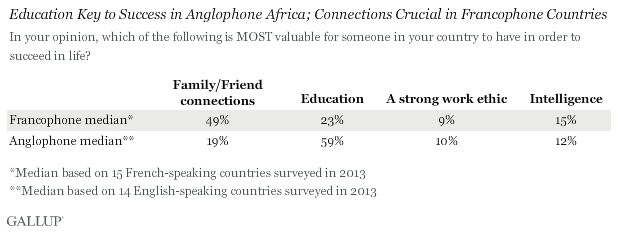
Bottom Line
Africa is one of the most dynamic and fastest growing regions in the world, with abundant natural resources, yet the continent’s leaders and the international markets have yet to fully tap one of their most valuable resources — their citizens. Good governance, jobs, training, and coaching could potentially translate Africans’ strong belief in hard work into real economic power.
Magali Rheault contributed to this report.
For complete data sets or custom research from the more than 150 countries Gallup continually surveys, pleasecontact us.
Survey Method
Results are based on approximately 1,000 face-to-face interviews each wave with adults, aged 15 and older. Surveys were conducted with 1,000 respondents from 2006 to 2013. For results based on the total sample of national adults, one can say with 95% confidence that the maximum margin of sampling error is ±3.9 percentage points. The margin of error reflects the influence of data weighting. In addition to sampling error, question wording and practical difficulties in conducting surveys can introduce error or bias into the findings of public opinion polls.
For more complete methodology and specific survey dates, please review Gallup’s Country Data Set details.
